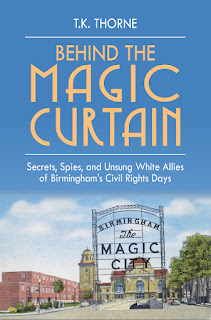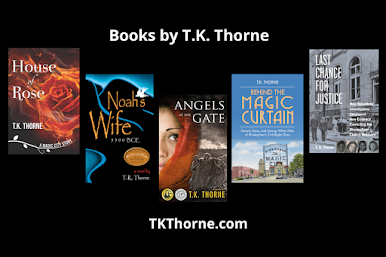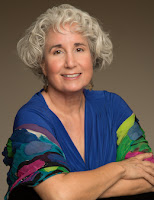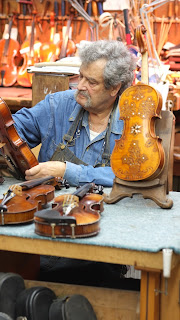Behind the Magic Curtain – by T. K. Thorne
Writer, humanist,
dog-mom, horse servant and cat-slave,
Lover of solitude
and the company of good friends,
New places, new ideas
and old wisdom.
Four men who loved the city of Birmingham, Alabama asked me to write a
book. I look back on that day when I met them in the high-rise office
of a prominent attorney. They were all strangers, decades older. They
had lived through “pivotal nation-changing days.”
Three of them had been in the thick of happenings.
As I sat at the polished hardwood table, I thought possibly they assumed
I was a scholar of civil rights because I had recently written a book
about the investigation of the 16th Street Baptist Church bombing that
killed four young black girls in Birmingham in 1963 (Last Chance for Justice),
but to my surprise, the gentleman who invited me to that meeting said
he had done so because of a totally different book, a historical novel
set thousands of years in the past in ancient Turkey (Noah’s Wife).
I had to ask him why he thought that qualified me. He said, “If you
could write a book about Noah’s wife and make me believe that was what
really happened, then you can tell the true stories of what happened
here.”
To say I was reticent was an understatement. What they were asking me to
do seemed a huge commitment, and so much had been documented about the
era, what could I possibly add? Then one of the men sent me his notes
about a day in 1962 when he pushed through the double glass doors of The Birmingham News, weary from an all-night stakeout with police, and
his eccentric, powerful boss shouted for him to join him for breakfast.
What was said at that breakfast changed a young reporter’s life and
affected the tangled web of history.
I was hooked.
After the better part of a decade, it is done. Regretfully, three of the fine gentlemen who trusted me to write this did not live to see it. I only hope I have been true to their vision.
What folks are saying:
Behind the Magic Curtain: Secrets, Spies, and Unsung White Allies of Birmingham’s Civil Rights Days is a remarkable look at a historic city enmeshed in racial tensions, revealing untold or forgotten stories of secret deals, law enforcement intrigue, and courage alongside pivotal events that would sweep change across the nation.
T. K. Thorne has hit another home run with Behind the Magic Curtain. For five and a half decades we have read accounts of the civil rights era in Birmingham and Selma written by those with a particular ax to grind. Thorne is an excellent reporter, recognizing the nuances that “outsiders” or opinionated writers could not see or chose to overlook. Her reading and especially her interviews over the past several years have been remarkable, allowing her to give far more accurate details than we have seen before. For those who want to know the secrets of what really went on behind the “magic curtain” in those pivotal nation-changing days, days that brought the Civil Rights Bill in 1964 and the Voting Rights Bill in 1965, this is an important book to read.
—Douglas M. Carpenter, Retired Episcopal minister and son of Alabama’s Episcopal Bishop, C. C. J. Carpenter.
In Behind the Magic Curtain, T. K. Thorne introduces us to
those who operated behind the scenes in the civil rights movement in
Alabama, shedding light on the individual moral complexities of these
participants—some firebrands, some reluctant players, and some predators
who worked for their own gain. This journalistic exploration of a
complicated time in Alabama’s social history will sit comfortably on the
shelf next to histories by Dianne McWhorter, Glenn Eskew, and Taylor
Branch. — Anthony Grooms, author of Bombingham and The Vain Conversation
Deeply engaging, Behind the Magic Curtain tells a forgotten part of the Birmingham story, prompting many “real time memories” for me. The lively and descriptive writing brought the characters and settings to life, while diving into the white community’s role in all its complexities. This is a treasure trove of stories about activities and perspectives not well known to the general public. In particular, journalist Tom Lankford’s sleuthing and the machinations of the Birmingham Police Department, along with the risk-averse role of the local newspapers, and a full blown portrait of the inscrutable Birmingham News VIP, Vincent Townsend, make for a fascinating read.
—Odessa Woolfolk, educator, community activist, and founding president of the Birmingham Civil Rights Institute
“T.K. writes like a seasoned news editor, meticulously hunting down facts and laying out the context in a colorful, intriguing way. Behind the Magic Curtain documents many untold stories and faithfully relates my own personal, unforgettable memories of a time of racial transition in Birmingham.”
—Tom Lankford, journalist for The Birmingham News
“Novelist and former Birmingham Police Captain T.K. Thorne demonstrates
there was more to Birmingham of the Civil Rights Era than Bull Connor,
Klansmen, and African-American protestors. Behind that “Magic Curtain,”
an ethnically diverse group from downtown to the surrounding bedroom
communities of ministers, priests, rabbis, newspaper reporters, and
housewives comprised a community belying monikers like ‘Bomingham’ and
‘Murder Capital of America,’ and fighting for justice in the Magic
City.”
—Earl Tilford, author of Turning the Tide: The University of Alabama in the 1960s
Available for Pre-order now!
NewSouth Books
Amazon.com
BarnesandNoble.com
T.K. is a retired police captain who writes books, which, like this blog, go wherever her interest and imagination take her. More at TKThorne.com





